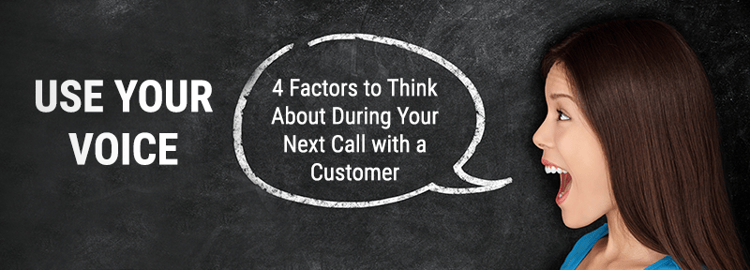
They say that 10 percent of conflict is due to a difference in opinion; the other 90 percent is due to the wrong tone of voice. When it comes to your customers, this is definitely something to keep in mind, as your voice can determine the outcome of any call. Just as you can give a caller a high level of comfort, you can give a caller a high level of anxiety — all with just your voice.
The voice you project is determined by four factors: energy, rate of speech, pitch and quality. You have complete control of all of these factors and can change them to create a professional environment between you and the caller. Here’s what you should think about for each factor:
1. Energy
Energy reflects your attitude and your level of enthusiasm. Higher (positive) energy will make your callers and customers feel like they are being listened to and will give them confidence that their message is being handled properly. Low (negative) energy, on the other hand, can come off as indifferent and give the caller a sense that their message or issue is not important.
2. Rate of Speech
The normal rate of speech is 125 words per minute. A faster rate of speech may make the caller think you’re rushing to get through the call. It also may make you harder to understand. A slower rate of speech creates the image to the caller that you do not know what you’re talking about or that you’re talking down to them. Both rates reflect poorly on the operator and can cost you control of the call.
3. Pitch
The pitch of your voice — the height or depth in the tone of your voice — can also affect the way the caller perceives you. A monotone pitch, where there are no changes in the tone of your voice, is the most difficult to listen to for any long period of time (think Ben Stein in Ferris Bueller’s Day Off). A high pitch wears on nerves very quickly and can sound unprofessional. Pitch can also have other effects; for example, ending sentences by bringing your voice up to a high pitch will immediately turn whatever you’re saying into a question instead of a statement. In the end, low pitch is the easiest to understand.
4. Quality
Combined, the first three factors make up the quality of your unique personal voice profile. Maintaining a positive energy level, talking at the normal rate of speech and avoiding monotonous or high pitches should be a priority when speaking with customers.
Fortunately, the right answering service will excel at all of these. Find the right one and you’re sure to impress any caller!
Editor’s note: This post was originally published in February 2012 and has been completely revamped and updated for accuracy and comprehensiveness.
.png?width=135&height=146&name=ABA_Logo_-_June_Picture_Blue_Trademark%20(1).png)


